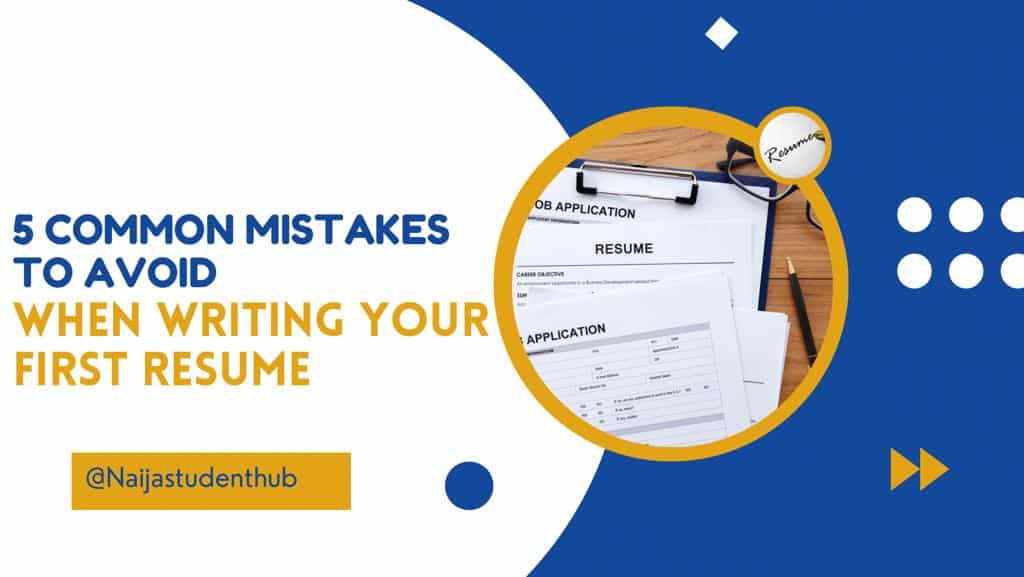For a first-timer writing a resume, it’s easy to try so many different things in a bid to land that job. Trust me, I’ve been there, and the results are mostly damning at the end, especially when the recruiter appreciates specific details. Recruiters use the résumé process to curate applicants, decide whom to invite to the interview, and select the best.
While they get up to picking and shredding, you can up the ante with a resume that gives you the best chance. However, here are 5 Common mistakes to avoid when writing your first resume.
- Packing in Too Much Information
Including too much information about yourself is a common mistake many people make. Get your résumé on one page, front side. No matter how complex you are and the wide range of skills you boast, recruiters are more interested in you as a person. They want to know what you’ll add to their organization.
Look at it this way, unless your hobbies directly relate to the position, leave them out. Also, avoid gaps in time.
Ensure you include all the essential information in the résumé. If there’s room left for more information, you can include facts about you.
- Incorrect Contact Information
Sounds too easy. I know. However, many factors could leave you forgetting to include your correct contact information. It’s still a common mistake first-timers make on their résumé.
If you get hired, the recruiter will use your contact information. It’s best to sort it out before anything else because it mostly appears at the top of the résumé page. Your contact information should contain the following:
- Full legal name
- Full mailing address
- Phone numbers
- Email address
- Personal website, if any
- Socials, depending on the organization
Even with all this information on your résumé, ensure they’re appropriate. For example, your email address should be formal. Leave out the adolescent stuff or face instant rejection.
- Focusing on Responsibilities
For your first time, include some information about the role you filled previously. However, it’s best to focus on achievements rather than job descriptions. Provide your successes and how you positively impacted the previous organization. This will show the recruiter your worth.
While writing this part, be as specific as you can. For example, “l received an award for my efforts at customer service.” This is better than any job description. Further, it’s best to focus on the verbs and other active worlds demonstrating your skills and capabilities.
- Typos and Grammar Mistakes
Your résumé is the first thing recruiters see about you; for that brief time, you want to leave a good impression. Also, some organizations use software to screen out applicants. With your résumé riddled with typos and grammatical errors, your chances of getting called reduce.
What can you do? Proofread your résumé after writing, then have a friend or family review it again. They will provide a fresh pair of eyes and another perspective on your writing. Just ensure that you submit a grammatically perfect résumé to your potential employer.
- Putting Vital Information Down Under
You’ll come across the term’ top fold’ at some point. The term refers to the top one-third of a document. Organize your résumé in a way that places the most crucial information in the “top fold.” Otherwise, you’ll bury your best information down below.
Remember, recruiters spend little time looking at your résumé, and most of those seconds are dedicated to the top third of the page. Use that spot to convince them with key accomplishments, skills related to the position, and experience. As for your contact information, they’re better placed at the bottom of the résumé where the recruiter will look to contact you.
What Might Happen if There Are Grammatical Errors in Your Résumé?
Firstly, such errors immediately cast doubt on your intelligence. For example, using present tense for previous job roles and exchanging words like good for food. Many recruiters associate these mistakes with lower intelligence and poor performance.
Secondly, it affects the tone of your writing. Remember, your résumé is you in paper form. That means what you write dictates how the reader perceives you and affects your chances of getting the job.
How to Handle Spelling and Grammar Errors in Your Résumé
While anyone can make a spelling or grammar error, it’s something you can avoid. Here are some tips to help you:
- As I said, get a second pair of eyes to examine your résumé.
- Read the résumé out loud to your hearing. Sounds good?
- Ensure the language is specific to the demands of the organization and region.
- Use grammar checker software to run through your résumé.
Final Thoughts
Instead of replacing ‘manager’ with ‘manger’ or leaving out key information like contact details and accomplishments, avoid these mistakes. Ensure you proofread your résumé and include necessary information tailored to fit the requirements of the recruitment team. Making common mistakes like the ones here could see you get rejected. You can always take your time to make sure you get it right.
